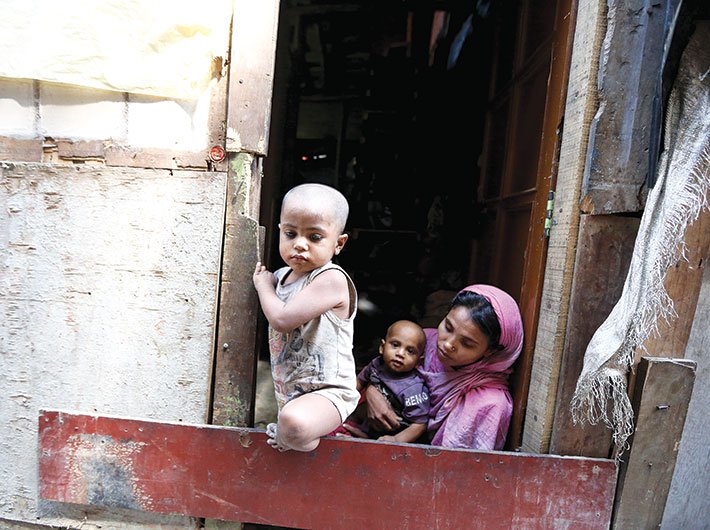About 36,000 Rohingya refugees from Myanmar are living in appalling conditions in India. A lot can be, and needs to be, done for their well-being
“Genocide begins with the killing of one man – not for what he has done, but because of who he is.”
– Kofi Annan
A poster bearing this quote and a photograph of the former UN secretary-general is fixed on a grey tin sheet that forms the wall of a shack. There are packets of chips strung below it. This is Abdul Karim’s makeshift kirana shop, on a dusty path leading to the Madanpur Khadar camp on the Delhi-Noida border. The poster means a lot to Karim: the words sum up his life as a Rohingya Muslim who fled Myanmar in 2012 after his community was targeted by the Rahkine Buddhists in the Arakan region.
For four days, he walked from his homeland to Bangladesh where he stayed for a month, before crossing the India-Bangladesh border. He is now one of the around 36,000 Rohingya refugees who have taken shelter in India.
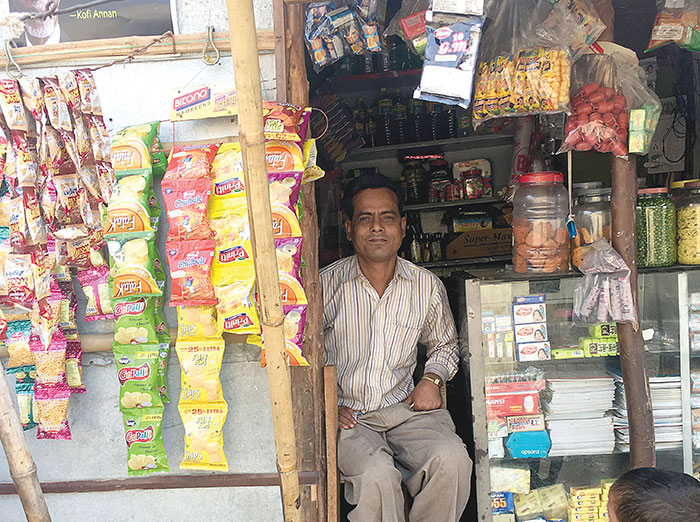
(A poster of Kofi Annan with his quote adorns Abdul Karim’s shop in Madanpur Khurd)
Living in a ramshackle jhuggi for more than four years now, Karim speaks of his wooden, airy home back in the Arakrans. But like most of the Rohingya refugees, he feels more protected here even if that means living in deplorable conditions. At least here, they have the freedom to move, marry and provide care to their children.
With a smile he says, “Here in India, we can move around, send our child to school and get married. There is no restriction as such, unlike back at home.”
India has provided asylum to thousands of Rohingya refugees who are mostly living in Jammu and Kashmir, Rajasthan, Andhra Pradesh, Delhi, Kerala and West Bengal. Around 6,000 of them have taken shelter in Delhi in areas like Shaheen Bagh, Vikas Nagar, Madanpur Khadar and Kalindi Kunj.
Historically stateless
The statelessness of Rohingya is not new; rather it has a historical backdrop to it. In Myanmar, Buddhists form the majority of inhabitants
while Rohingya Muslims are an ethnic minority. Most Rohingyas are from the Rakhine state, the most deprived part of Myanmar.
The antagonism between the two communities started in the 18th century with the Buddhists of south Burma occupying the Arakan region, then dominated by the Muslim population, which was forced to escape to Bengal, formerly part of British India. Later, the British facilitated a forced migration of many Rohingyas to work as agricultural labourers in the Arakan.
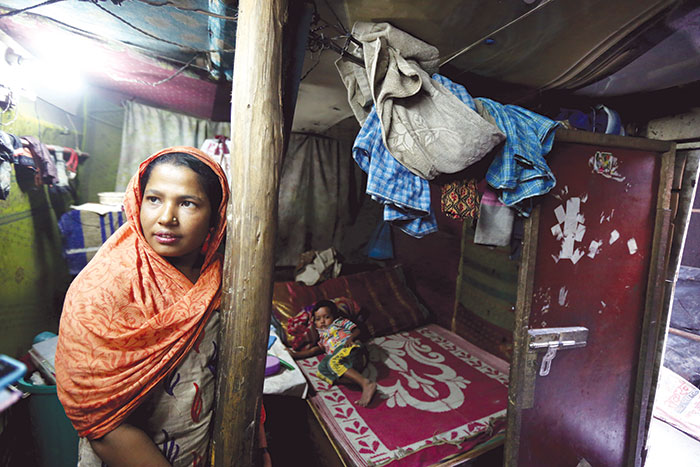
(Noor and her child inside their little shanty)
With Myanmar acquiring independence in 1948, discrimination against the Rohingyas started as they were not included in the officially recognised ethnic groups of the country. Further, they are also deprived of citizenship under Myanmar’s 1982 Citizenship Law. This means that they don’t have passports or other regular documents. As a result, their rights to education, livelihood, movement, marriage, health and practice of their religion are limited. The Rakhine Buddhists perceive the Rohingyas as “illegal Bangladeshi immigrants” and call them Bengalis – even to those whose forefathers lived there. The anti-Rohingya faction is led by Ashin Wirathu, the Mandalay-based Buddhist monk. According to him, Myanmar is susceptible to an inflow of “Muslim hordes”, referring to the Rohingyas.
Instances of torture, rape, arbitrary detention and violence against the Rohingyas are usual affair in Rakhine, with many incidents unreported. Their movement is restricted to nearby regions. If they travel without authorisation, they can be tried and imprisoned.
Amidst conspicuous increase of violence, the Rohingyas have made several attempts to escape such systematic persecution. In 2012, more than 1.1 lakh Rohingyas left on boats to countries such as the Philippines, Malaysia and Thailand. The others crossed the border and reached Bangladesh, where some took asylum while others tried to get into countries like India and Pakistan in search of better livelihood.
Efforts of the UN and other NGOs
“The Rohingya refugees are one of the most impoverished and disempowered refugees. They live in difficult conditions and most of them are uneducated. Therefore, it is not easy for them to find good jobs. Rather, they work as daily wagers. They live in unsanitary conditions; they don’t have toilets in the slums – the foremost cause of various diseases,” says Ipshita Sengupta, policy associate, UN High Commissioner for Refugees (UNHCR) India.
UNHCR provides documentation to all refugees in India as the country has neither signed the UN 1951 convention on refugees nor does it have a separate law to safeguard and protect refugees.
Commonly, it is the asylum-seeker who approaches UNHCR for documentation, but in the case of Rohingyas, the UN agency began a special programme, given the poor financial condition of the refugees and the fact that they can’t afford to travel. Says Sengupta, “Now, we reach out to the community and have biometric data collection to ensure better documentation. UNHCR’s aim is to go beyond giving asylum to Rohingyas; rather it is to give them a life of dignity in asylum. Therefore, there is a need for attention on education, livelihood and upliftment to bring them out of poverty which cannot be achieved in a short period. It is a long-term plan towards which we have to gradually move.”
Other than providing them refugee cards, UNHCR has tried to map out the needs of the community. For this, it has partnered with local NGOs at different locations. In India, refugees have access to government services like health, education, legal aid and government welfare schemes. UNHCR officials suggest that they have been able to use these services effectively in Delhi, where a large number of refugees are staying. One of UNHCR’s NGO partners in Delhi is BOSCO. Its project manager Selin Mathew, who works to improve the lot of Rohingya refugees, says, “We have been conducting various training programmes for different jobs which involve skilled and semi-skilled labour like working in call centres, plumbing, working as an electrician etc.”
Ground reality
Many refugees in Madanpur Khadar are not happy. They don’t have access to clean drinking water because there are no pipes to their ramshackle homes. They are forced to buy packaged water. They grumble that an NGO has provided them two-three 2,000-litre tanks which are of no use and are lying idle in front of the jhuggi like trash.
One cannot deny the fact that help is coming from UNHCR and NGOs but it is important to understand the practical needs of the community. There is huge resentment among the Rohingyas over discrimination against them when compared to other refugees. Abdullah, a refugee, questions, “We know that India doesn’t have a law for refugees, but why is there discrimination between us and the Afghans and the Somalians who are given monthly allowance of Rs 3,000 by the UN? Why aren’t we getting any allowance? There should be equal treatment for all.”
He adds, “With the allowance other refugees get, they have made their lives better, they send their children to good schools and they are able to do a lot. We also want to lead a good life.”
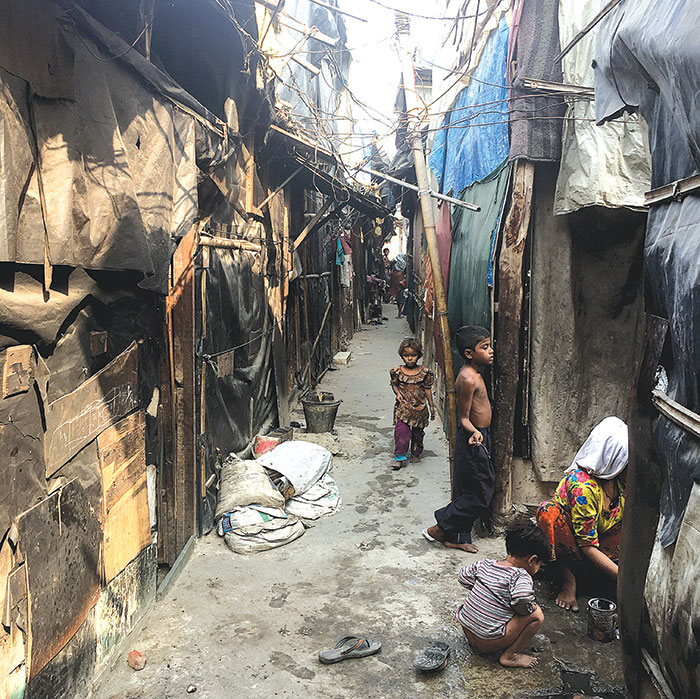
(This alley is part of the living space at a Rohingya camp)
Karim too feels left out. “The issue of our resettlement has been ignored, while other refugees like the Buddhists and the Afghans are being resettled.” He believes this discrimination is because his community is the poorest of all the refugees.
The UNHCR has provided the Rohingyas with refugee ID cards, but they are of limited use. The IDs are not deemed authentic identification by potential employers; telecos don’t issue SIMs against them. “It only helps to keep the police from arresting us,” says Karim.
Like many others, Noor came to India in 2012 for a better future, especially for her children. She has four kids and helps her husband at his kirana store. “I am not educated, but I always wanted my children to go to schools and have proper education. And I am very happy that two of my kids are going to school. Back home, this was a big problem. Though there are some problems here as well, like, my child faces difficulty in understanding things in class because of language barrier.” Most of the Rohingyas speak in broken Hindi with a Bangla touch in their accent.
A world in denial
As most Rohingyas are well aware that they are outsiders in India, they don’t want to stay here for long. “I came to India only to go back to Myanmar. I have to first save my life; then only can I save the lives of others. I want to return to my country, but how? There is no peace for us. I don’t belong to India and the Buddhists say that I don’t belong to Burma either. Then which country on earth do I belong to? Everyone has a country,” says Mahmood Farooq, with a despair of leaving his home and relatives back in Myanmar. Farooq works as a daily wage labourer in Delhi.
Back in Myanmar, its leader Aung San Suu Kyi, an influential global figure, has remained silent on the Rohingya issue. The Nobel laureate has shown no eagerness to resolve the Rohingya crisis since coming to power in 2015, and has constantly denied that the Rohingyas are being terrorised. She seems conscious not to miff the radical Buddhists in her country who voted her to power.
October 2016 again saw fresh incidents of assault on the Rohingyas by the Myanmar army. This brought forlornness in the Rohingya camps in Delhi. Many were wretched to hear about the burning of villages and the clashes back home. Hearing of it, Farooq cries, “They are burning our houses with people inside. How can somebody burn a live person? Oh God! There is no humanity left. Someone has to save us.”
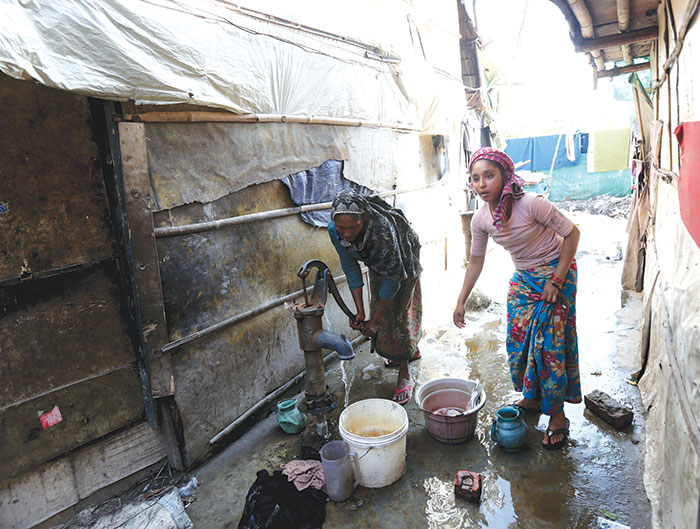
(Drinking water is scarce at the refugee camp)
Subsequently, the international communities have criticised Suu Kyi for “taking no action against the persecution of Rohingyas despite being the so-called icon of democracy”. Some humanitarian organisations have demanded that Suu Kyi should return the Nobel Prize.
Suu Kyi has denied the allegations and accused the international community of intensifying the conflict. Speaking to Singaporean broadcaster Channel News Asia in December last year, she said, “I’m not saying there are no difficulties, but it helps if people can recognise the difficulty and are more focused on resolving these difficulties rather than exaggerating them so that everything seems worse than it is.”
Meanwhile, the crisis came to the forefront with Bangladesh refusing to take in Rohingya refugees. Though Bangladesh has provided shelter for decades to Rohingyas, it currently perceives the refugees as an economic burden. The Rohingyas are now being linked with Islamist extremists in Bangladesh.
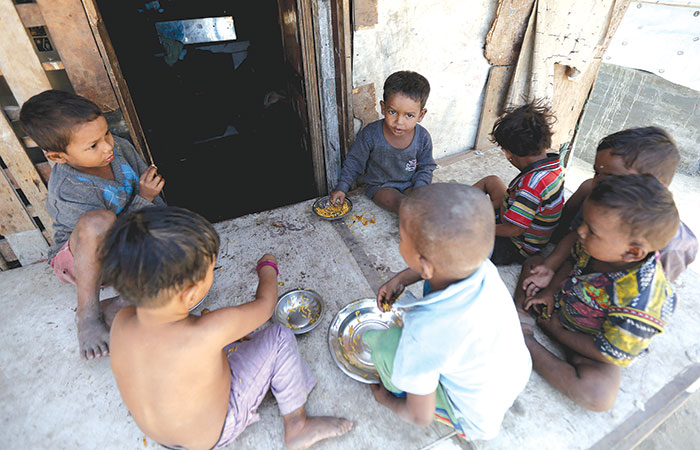
(The sorry state of Rohingya kids speaks of their bleak future)
The Rohingyas lead lives of utter destitution; in India, they have some liberty, but that comes at the cost of living in abysmal conditions. But the main woes in the Rohingya crisis arise out of their homeland. The Rohingyas are searching for a silver lining, though they are lost amidst the home and the world. “I wish to go back home only if the situation gets better,” says Karim, who is hopeful, like most other Rohingyas.
sneh@governancenow.com
(The story appears in the January 16-31, 2017 issue)

